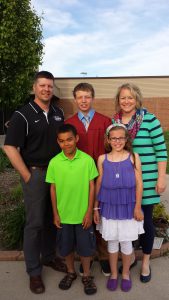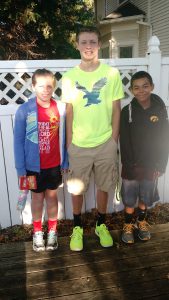 by Troy Vander Molen, CEO and Physical Therapist at Kinetic Edge
by Troy Vander Molen, CEO and Physical Therapist at Kinetic Edge
The year continues to move along, and November, one of my favorite months, is already upon us. It seems that many in our society rush from Halloween to Christmas, ignoring what I consider to be one of the best and most meaningful holiday seasons.
I am particularly fond of Thanksgiving because it is much more difficult to materialize. Sure, maybe you’ll sometimes hear it referred to as “Turkey Day,” and, make no mistake, I love turkey. But that’s not the reason I love Thanksgiving. I love it because it is a season that is most characterized by an attitude and a posture more so than an action or an event.
My teammates at Kinetic Edge know that I usually refer to Thanksgiving in a slightly different way, because it draws attention to the attitude and posture of this season. So, on behalf of Kinetic Edge, I want to wish you a Happy Gratitude Month!
Last year at this time, I received an email that focused on gratitude during the Thanksgiving season from Larry Benz, a strong leader and ambassador for physical therapists in private practice and a friend of our practice. In this email, he gave a summary of gratitude from an academic perspective. Did you know that it is scientifically proven that the trait of gratitude is one of the top three strengths that predicts well-being?
Human beings have a natural tendency to focus on the negative, but a simple blessings exercise has been shown to contribute to positive changes in depressed people. In the rehab world, various levels of depression are extremely common. Therefore, as rehab professionals, we consider it one of our major roles to facilitate a better understanding of the possibilities for health, happiness, and hope. What impact do you think a medical practitioner that models gratefulness can have on the health benefits of his patients?
Check out part of Larry Benz’s message on the medical benefits that accompany gratitude:
Physical therapy is a serving profession, and several researchers have conceptualized gratitude as an emotion that is always directed towards appreciating the helpful actions of other people (McCullough, Kilpatrick, Emmons & Larson, 2001). Grateful people experience more positive emotions, have greater life satisfaction, and are more hopeful about the future compared to ungrateful people (Emmons & McCullough, 2003). Furthermore, highly grateful people are more empathetic, forgiving, and supportive, and less likely to be depressed, anxious, and jealous (McCullough, Tsang, & Emmons, 2004). When medical practitioners are grateful, it reaps substantial benefits for their patients that can likely influence clinical outcomes in a positive way.
Throughout history, many cultures have regarded the experience and expression of gratitude as beneficial for individuals and society, as evidenced by its inclusion as a character strength that has been valued across religions and philosophies for centuries (Peterson & Seligman, 2004). In addition, trait gratitude is one of the top three strengths that predicts subjective well-being (Park, Peterson, & Seligman, 2004). The research on gratitude suggests it is a key element for sparking positive change and is an important component of the good life (Bono, Emmons & McCullough, 2004). Not only is gratitude strongly associated with happiness, but experimental manipulations of gratitude have been shown to enhance well-being (Watkins, Van Gelder, & Frias, 2009) as well as creativity and problem solving–two keys to better clinical decision making (Estrada, Isen, & Young, 1994).
There have been many studies exploring the link between gratitude and well-being. For example, participants in one study were asked to write down five things for which they are grateful for once a week for ten weeks. A group was asked to list five daily hassles (Emmons & McCullough, 2003). The results were impressive: relative to the control group, the participants who expressed gratitude felt more optimistic and more satisfied with their lives. Even their health received a boost: they reported fewer physical symptoms (such as headache, acne, coughing or nausea) and more time spent exercising. A study of internet-based interventions showed that participants who were randomized to a group that focused on a “three good things in life exercise” (they were asked to write down three things that went well and their causes every night for a week) increased happiness and decreased depressive symptoms for six months (Seligman, Steen, Park & Peterson, 2005).
Seligman, Rashid and Parks (2006) showed the benefits of the blessings exercise in depressed patients. Human beings are naturally biased toward focusing on and remembering the negative, which is further exacerbated in depression. The aim of the blessings exercise is to re-focus the patients’ attention, memory, and expectations away from the negative and toward the positive. They theorize that the blessings exercise is effective because it counteracts a tendency toward hyperfocusing on negative events, which contributes to depression. Lyubomirsky (2007) describes the numerous ways gratitude boosts happiness: it promotes the savoring of life experiences, it bolsters self-worth, it helps people cope with stress and trauma, it encourages moral behavior, and it can help build social bonds.
At Kinetic Edge, we care about your health, happiness, and hope. Research shows that the action of being grateful will help with all three of these. Over the course of gratitude month, I’d like to challenge you to make your own Top 5 list, recite “three good things in life”, or participate in a blessings exercise – as you enjoy time with your families and friends during this season of gratitude.
Here are three good things in my life that I’m grateful for right now:
1. My wife of 22 years, Stephanie, and my three great children – Kade (15), Ty (11) and Claire (10).


2. Great teammates at Kinetic Edge who exude health, happiness, and hope.

3. An undefeated Hawkeye football team and unprecedented success for the Royals after three decades of futility.





